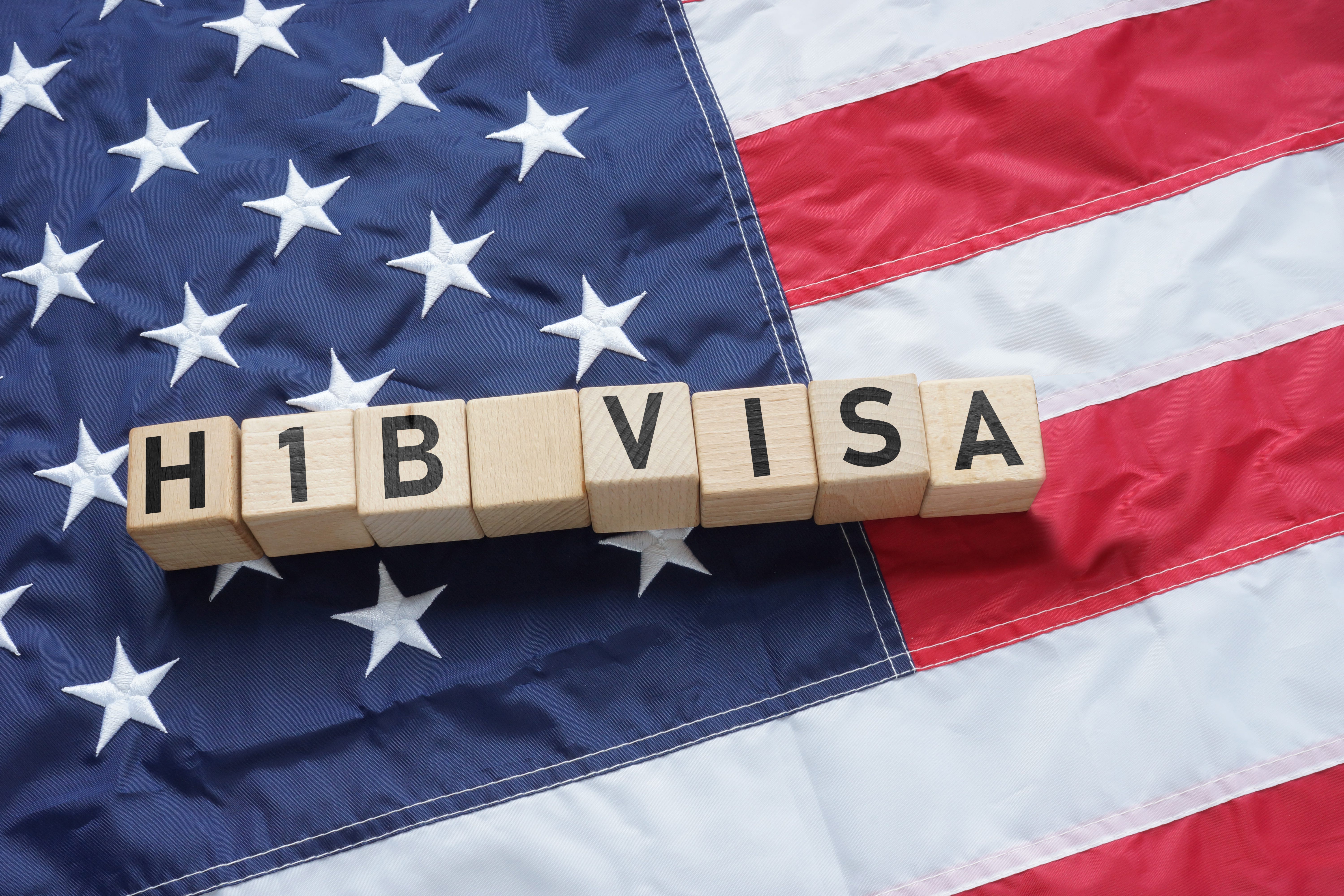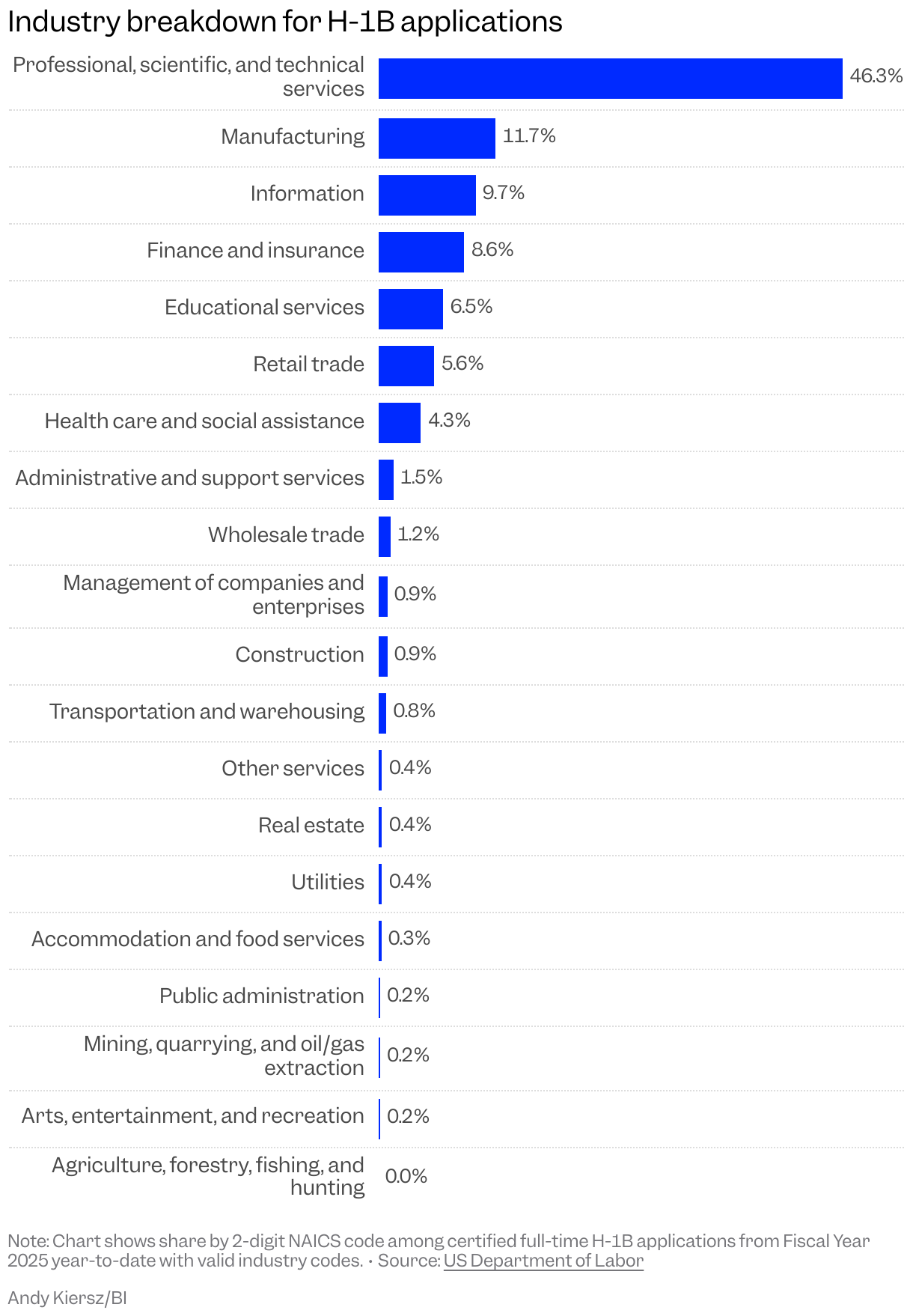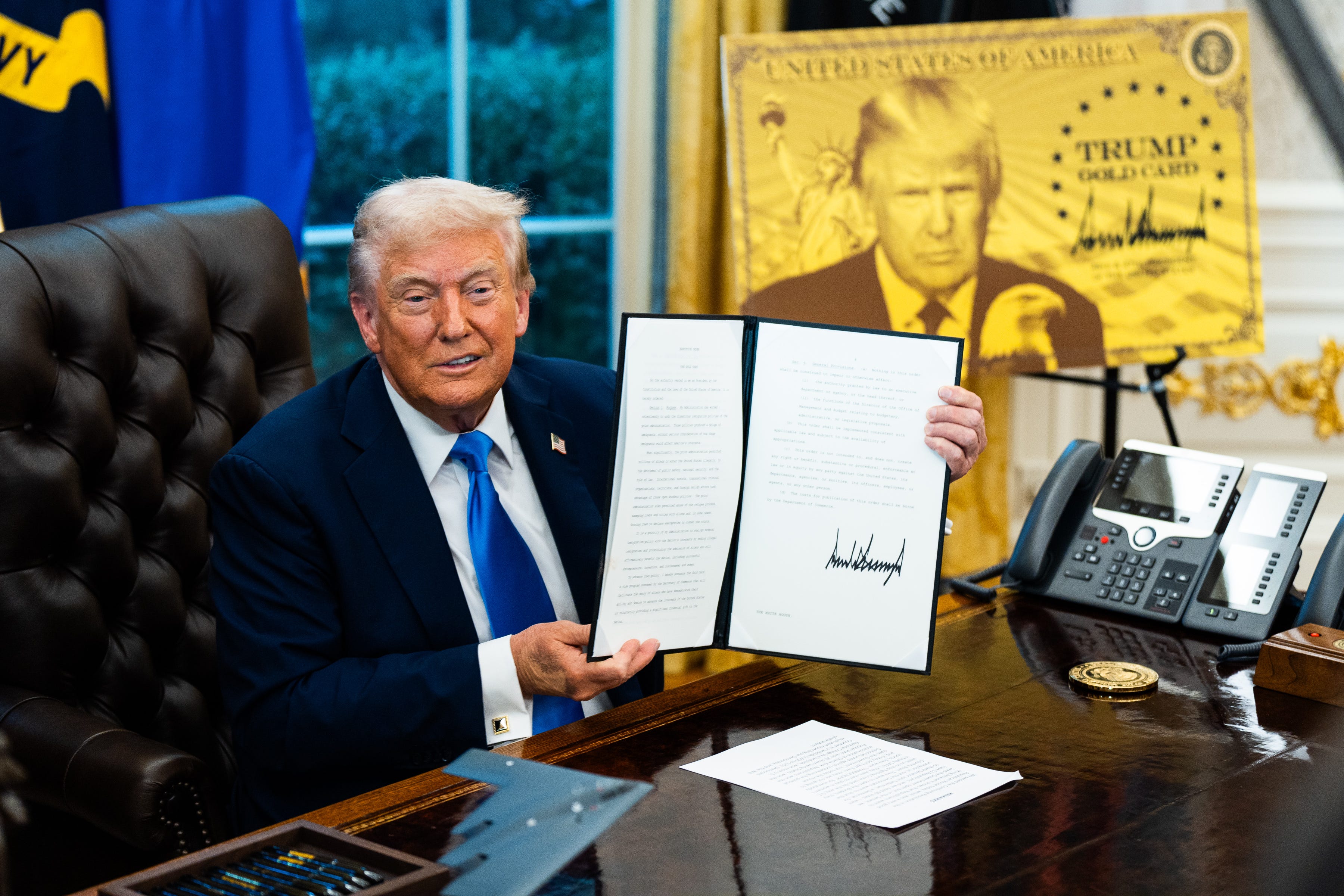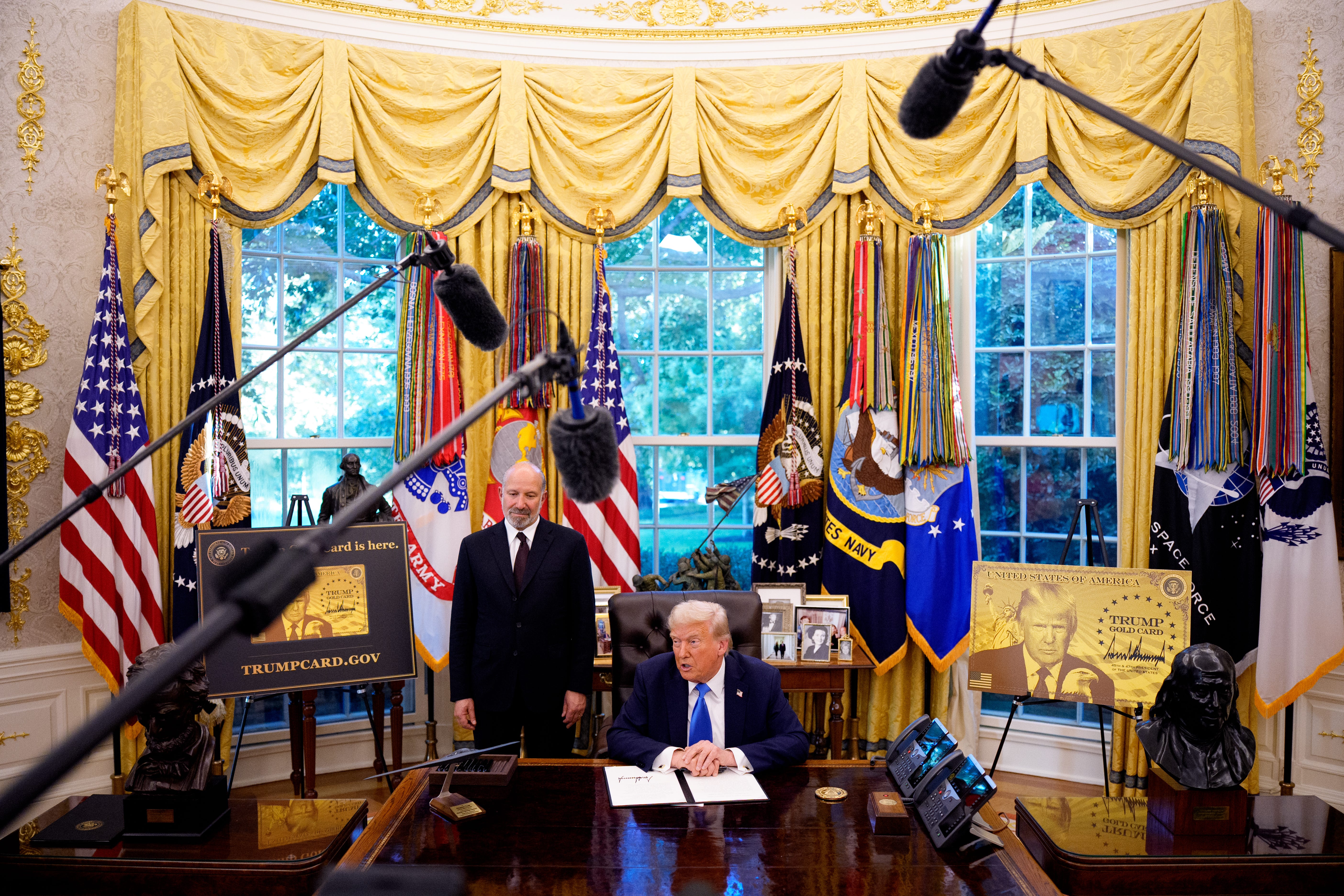
Andrii Dodonov/Getty Images
Minutes after President Donald Trump signed his H-1B visa executive order Friday evening, panic rippled through the cabin of an India-bound Emirates flight about to take off from San Francisco.
As passengers’ phones lit up with calls and emails about the order, dozens of H-1B visa holders started walking off the plane one by one. Each exit sent ground crew scrambling to dig through the hold for luggage. In the cabin, tempers frayed. People whispered anxiously.
From her window seat, Zarna Joshi, a US citizen and healthcare worker, watched as cart after cart of bags was hauled back away from the aircraft. It was a nightmare, Joshi told Business Insider. “We’d already been onboard for two hours, and there were no updates — just more people leaving.”
By Joshi’s count, at least 40 passengers walked off the plane. Some wavered, torn between long-awaited reunions and urgent company emails. A Microsoft employee sitting near Joshi initially refused to get off, saying that she hadn’t been home to India for three years. A half hour later, after receiving an email from Microsoft’s immigration team, she stood up silently, grabbed her things, and left the plane. Emirates didn’t respond to requests for comment.
Trump’s Friday order said companies would need to pay a $100,000 fee for employees on H-1B visas, a move that sent shockwaves through Silicon Valley and much of corporate America. For decades, the tech industry has leaned on H-1B visas to fill specialized roles for engineering and research. Just weeks earlier, the country’s most powerful technology CEOs — Microsoft’s Satya Nadella, Google’s Sundar Pichai, Meta’s Mark Zuckerberg, OpenAI’s Sam Altman, and Apple’s Tim Cook — sat around a White House dinner table, repeatedly thanking and praising Trump, while he lauded their US investments.
Any goodwill from that dinner didn’t last long. Hours after the order, immigration and HR teams at Google, Amazon, Microsoft, Meta, Salesforce, JPMorgan, and Zoom blasted out urgent warnings: don’t leave the US if you’re on an H-1B, and get back within 24 hours if you’re abroad. H-1B visa-holding employees were scrambling for flights and flooding legal teams with desperate questions. Lawyers scrapped their weekends to field panicked calls, while thousands of workers vented online in group chats and social media.
By Saturday, the White House tried to clarify the situation: the fee applies only to new petitions, not renewals, and visa holders won’t be blocked from returning, it said. On Sunday, it also published an FAQ about the order.
The administration cast the fee as a corrective. In the executive order, Trump said that the H-1B system had strayed from its original purpose of filling high-skill shortages and was instead being “deliberately exploited to replace, rather than supplement, American workers with lower-paid, lower-skilled labor.” He pointed to IT outsourcing firms as egregious abusers, saying that they used the program to undercut wages and push Americans out of jobs in critical fields like computer science and engineering.

The H-1B program itself has long been a flashpoint in US politics. Created in 1990, the visas allow American companies to temporarily hire highly skilled foreign workers for jobs that employers say can’t be filled by US talent. Indian workers dominate the program: in fiscal year 2024, more than 70 percent of approved H-1B petitions — roughly 280,000 people — went to Indian nationals, according to USCIS data.
That dominance has fueled resentment in some corners of the American workforce and, more recently, spurred cultural backlash. When Sriram Krishnan, an Indian-born venture capitalist and a supporter of legal immigration reform, was tapped for a prominent role in the Trump administration in December 2024, he faced a torrent of complaints that echoed long-running criticism of the visa program.
The order framed those grievances in stark terms. It highlighted cases in which large US companies laid off thousands of Americans while simultaneously hiring thousands of H-1B workers. Imposing a $100,000 fee, the order concluded, was necessary to curb abuse, raise wages for American workers, and ensure the program remained limited to what Trump called “the best of the best.”
Some in the tech industry cheered the move. Netflix cofounder Reed Hasting posted on X that the new fee was a “great solution” that would reserve H-1B visas “just for very high value jobs.”
Business Insider spoke to more than a dozen tech workers, VCs, and immigration lawyers about how they were grappling with the uncertainty and what they were planning to do next. Amid the frenzy, one thing seems to be clear: the new rules mean hiring the foreign talent that companies have long relied on is set to get far more expensive.
Big Tech’s big Friday night mayhem
Akaash Hazarika’s Toronto vacation ended with a Friday night scramble for a $500 plane ticket back home to the States. The 29-year-old Salesforce engineer cut his trip short and raced for a 6 a.m. flight back to Bellevue, Wash. Hazarika had no choice. Salesforce had already emailed with a warning: Get back to the US within 24 hours.
“It was stressful,” Hazarika told Business Insider. “I didn’t sleep all night. I kept thinking: What if I get stuck outside the US?”
At Microsoft, which applied for more than 5,500 H-1B visas in fiscal year 2024, the order triggered instant turmoil. “This is going to rock our shit,” one employee told Business Insider on the condition of anonymity. “The number of H-1Bs we use is very high, and the number of H-1Bs our partners and contractors use is also very high.”

Demetrius Freeman/The Washington Post via Getty Images
On Friday night, Microsoft sent out a warning to employees: “Beginning at 12:01 a.m. eastern time on September 21, individuals will not be able to enter/return to the U.S. in H-1B status unless their petition has an additional $100,000 payment associated with it,” the internal memo viewed by Business Insider, states. It advised those already in the country to “remain in the U.S. for the foreseeable future” and those abroad to “do what you can” to return before the deadline.
“The Trump administration gave no real advance warning on the proclamation, and so everyone is reacting together,” a Microsoft executive who wished to stay anonymous told Business Insider. “People are shocked and confused. There’s a lot of anxiety. A lot of people canceled travel plans or rushed back.”
Sherin Sunny, a senior software engineering manager at Walmart, told Business Insider that the 36 hours following Trump’s order were filled with panic and fear. He was constantly checking YouTube, LinkedIn, and the White House official channels for clearer instructions.
Google’s immigration lawyers also spent Friday night trying to understand the order and alert employees that they were monitoring the situation. Employees on H-1Bs who were in the US were advised to remain in the US, while those outside of the country were told they should do their best to re-enter the US by 12:01 a.m. on Sunday. In 2024, Google applied for nearly 5,500 H-1B visas for its employees, according to USCIS data.
“Departing the U.S. may result in complications or denial of re-entry under the new policy,” read an email to Googlers sent by BAL, the company’s immigration law firm. Googlers outside the country who might not make it back by the deadline were told to alert someone via Google’s internal immigration portal. “We understand this may create challenges, and we are here to support you,” the memo added.
Meta warned employees on Friday night, in guidance viewed by Business Insider, to reassess travel plans for the next 14 days or consider returning to the US before the executive order takes effect.
Other companies, including Amazon, Zoom, JP Morgan, and many others, sent similar advisories to employees.
Google, Salesforce, and Meta declined to comment. Amazon did not respond. A spokesperson for Microsoft said, “The clarifications from the U.S. government yesterday were very helpful and much appreciated.”
“Kneecaps startups'”
Big Tech might pay up, but startups could be priced out.
“I think Big Tech companies will probably take the path of least resistance, which is just pay,” Deedy Das, a partner at VC firm Menlo Ventures, told Business Insider. “I think it hurts startups the most.”
“A $100K annual fee won’t bother Big Tech, but it kneecaps startups and bodyshops the same, and that’s a mistake,” posted Y Combinator President and CEO Garry Tan on X on Saturday. Early-stage teams, he argued, simply can’t swallow a tax that high.

Andrew Harnik/Getty Images
Sophie Alcorn, founder of Alcorn Law in Palo Alto, California, whose clients include venture capital firms and small startups, said smaller companies and startups could be hit hard by the change if they find the $100,000 tab prohibitive. By comparison, she said, Big Tech could absorb the cost for some workers.
Menlo Ventures’ Das said the math alone shows why startups are most exposed. “An early-stage startup is probably not paying too much more than like $150,000 to $200,000 for base salaries,” he told Business Insider. “So if you’re looking at $150,000 to $200,000 and you say, hey, let’s tack on a $100,000 fee … it makes it a little bit harder for them to hire.”
David Hornik, a founding partner at Lobby Capital, said the consequences go beyond balance sheets. “Any impediment to H-1B visas is a detriment to the country and startups,” he told Business Insider, noting that the startup world relies heavily on the expertise of foreign citizens. “If we’re going to create an impediment to hiring the best possible people, then we will be creating an impediment to creating the best possible companies.”
Hornik said hiring Americans has never been the issue. Startups want the best candidates wherever they are. If US immigration rules make it too difficult to bring those workers here, he said, young companies will have no choice but to spread their teams across borders and hire talent abroad instead of building in America, he said.
“They’ll just move the jobs to Vancouver.”
The $100,000 fee isn’t just about cost. It risks pushing jobs out of the US altogether.
Peter Rahbar, an employment attorney who founded the boutique firm the Rahbar Group in New York, told Business Insider that even among the tech heavyweights, the cost would likely dissuade some hiring. He said that if it remains in place, big companies could shift work overseas to where the talent is.
A Microsoft executive told Business Insider the company could simply shift more workers to Canada, where immigration laws are friendlier. “So the US doesn’t get $100,000,” they said, “and probably loses $100,000 a year in federal and state tax revenue per immigrant. No net new US jobs will be created. They’ll just move the jobs to Vancouver.”
One Google manager remarked that the company had been offshoring many roles in some of its units, instead hiring in locations such as Mexico and India, and that they expected the executive order would only accelerate that. Another Google employee said, “For a company as big as ours, I can just see us hiring more abroad instead.”
Large American tech companies have already been expanding outside traditional hubs like the Bay Area and New York, and setting up offices in Vancouver, Mexico City, and Bangalore. This order, insiders say, only gives them more reason to accelerate those moves.
Das agrees that the Big Tech companies will continue to grow offices in other parts of the world. “This is an additional incentive for them to continue to accelerate that,” he said.
Jason Finkelman, an immigration attorney from Austin who has been advising companies on employment-based immigration for more than 15 years, told Business Insider that the order is almost certain to be tested in court. While presidents have broad leeway to issue executive orders, he said, charging $100,000 for an H-1B petition has no clear basis in law. “The proclamation says, in very general terms, it’s to protect American jobs,” he said. “That’s not enough.”
He predicted lawsuits from employers ranging from one-person startups to Big Tech companies. Even if the order is eventually overturned, Finkelman warned, the signal it has already sent could leave lasting scars.
“The damage was done the moment it was announced,” he said.
Tim Paradis, Brent D. Griffiths, and Shubhangi Goel contributed reporting.
Have a tip? Contact Pranav Dixit via email at [email protected] or Signal at 1-408-905-9124. Use a personal email address, a nonwork WiFi network, and a nonwork device; here’s our guide to sharing information securely.
Read the original article on Business Insider
The post Confusion and chaos: Trump’s $100K H-1B visa fee rocks Silicon Valley’s hiring machine appeared first on Business Insider.




